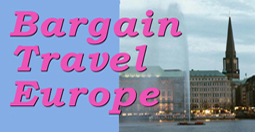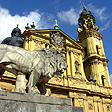FUGGER & WELSER MUSEUM – AUGSBURG
Bringing Renaissance Business World to Life
 Maybe you’ve heard the term “Rich as a Lannister” if you’ve binge-watched “Game of Thrones”. Maybe you haven’t. You’ve probably heard of the Medici, the enormously wealthy and powerful family of the Italian Renaissance. But unless you’re from Germany, you may not have heard of the “really rich Fuggers” of Augsburg. Okay, stop sniggering.
Maybe you’ve heard the term “Rich as a Lannister” if you’ve binge-watched “Game of Thrones”. Maybe you haven’t. You’ve probably heard of the Medici, the enormously wealthy and powerful family of the Italian Renaissance. But unless you’re from Germany, you may not have heard of the “really rich Fuggers” of Augsburg. Okay, stop sniggering.
In the 16th Century, Augsburg was referred to as the “Florence of Germany” by no less than Martin Luther confidante Philipp Melanchthon, and its position of prominence in the German Renaissance was due greatly to two wealthy families, the Fuggers and the Welsers, who had built the local mining industry into a world trade empire.
 A new museum dedicated to their story has opened in a renovated building that is itself a part of the tale of the Renaissance in Augsburg. The Fugger and Welser Museum is housed in the Wieselhaus, built around 1530 by another local figure, Johanne Wiesel, a successful optician of Augsburg who developed microscopes and telescopes as well as eye glasses. The story to be found in the house is of the mining trade, business and shipping, and the social world of vibrant, thriving Augsburg.
A new museum dedicated to their story has opened in a renovated building that is itself a part of the tale of the Renaissance in Augsburg. The Fugger and Welser Museum is housed in the Wieselhaus, built around 1530 by another local figure, Johanne Wiesel, a successful optician of Augsburg who developed microscopes and telescopes as well as eye glasses. The story to be found in the house is of the mining trade, business and shipping, and the social world of vibrant, thriving Augsburg.
 What is striking in the museum is its use of new technology to illustrate the old world. Flat video screens, talking picture frames and pseudo holographic projections with costumed characters in dialogue recreations with whom it is possible to a converse, or at least ask questions, bring the world to life, more an information amusement zone, with dramatized story-telling and hands-on discovery games, than staid museum of artifacts.
What is striking in the museum is its use of new technology to illustrate the old world. Flat video screens, talking picture frames and pseudo holographic projections with costumed characters in dialogue recreations with whom it is possible to a converse, or at least ask questions, bring the world to life, more an information amusement zone, with dramatized story-telling and hands-on discovery games, than staid museum of artifacts.
 On entrance to the museum, each visitor is given a small sack of pepper, to represent a trade item. When placed on special markers throughout the museum, the interactive exhibits will activate. Rather like those movie tricks of Harry Potter with the talking picture characters, but here it is the characters of Jakob Fugger “the Rich” and his business partner, Bartholomäus Welser, who are the principal players, as well as family members and society figures.
On entrance to the museum, each visitor is given a small sack of pepper, to represent a trade item. When placed on special markers throughout the museum, the interactive exhibits will activate. Rather like those movie tricks of Harry Potter with the talking picture characters, but here it is the characters of Jakob Fugger “the Rich” and his business partner, Bartholomäus Welser, who are the principal players, as well as family members and society figures.
Maritime Trading Routes
 After a look in the Living Book, the first multimedia experience of the museum, laying out the storyline, on the ground floor, you start by learning about the economic growth of the trading route between Augsburg and Venice, following the old Roman route across the Alps, which established Augsburg (named for Caesar Augustus) as the northern trade center of the Holy Roman Empire. Augsburg is land-locked, so it was through Italy that the family reached across the oceans to the New World and the East.
After a look in the Living Book, the first multimedia experience of the museum, laying out the storyline, on the ground floor, you start by learning about the economic growth of the trading route between Augsburg and Venice, following the old Roman route across the Alps, which established Augsburg (named for Caesar Augustus) as the northern trade center of the Holy Roman Empire. Augsburg is land-locked, so it was through Italy that the family reached across the oceans to the New World and the East.
Social and Business Life “Golden Office”
 On the first floor of the museum, the interactive exhibits delve in more depth into the social networks on which a business empire is founded. There is an introduction to Johann Wiesel who built the house and his world, and here is the “Golden Office” a recreation of the office of Jakob Fugger at the heart of his world, where you can listen to an imagined conversation with the younger Welser family head and protégé in discussion over their business interests.
On the first floor of the museum, the interactive exhibits delve in more depth into the social networks on which a business empire is founded. There is an introduction to Johann Wiesel who built the house and his world, and here is the “Golden Office” a recreation of the office of Jakob Fugger at the heart of his world, where you can listen to an imagined conversation with the younger Welser family head and protégé in discussion over their business interests.
On the second floor, in a more open room where entertainments might have been held, several interactive screen listening stations allow a gossip’s view of a 16th Century “Burgher Dance”, where the local city figures from the time are gathered for a social event and chat with each other about business, politics and religion, like any upper crust cocktail party.
Mining
Below ground is an excavated Vaulted Cellar, where the mining industry which produced the Fugger wealth is explored, illustrating the innovative mining techniques of the age and the working conditions for miners, including women and children. The cellar also features a wall of :manillas”, bangles of copper, bronze and brass that served the Portuguese in West Africa as trading currency for buying gold, ivory and slaves.
Spirit of Trade Table Game
One of the most entertaining exhibits you’ll find in a museum is the Interactive Table of the Spirit of Travel and Enterprise. It is played as a game where you load goods on a ship and make a treacherous voyage from Europe to India, trying not to be sunk in stormy seas where sea monsters and pirates lurk.
Garden
In the garden of the Wieselhaus, once belonging to a monastery next door, discover plants the herbalists of the 16th Century studied, and the learn of Philippine Welser, historian and archaeologist, Markus Welser, and a well-travelled doctor, Leonhart Rauwolff.
Visiting the Fugger and Welser Museum
Open hours are 10 a.m. to 5 p.m. Tuesday to Sunday and on public holidays, except Christmas. Admission for adults is €6, students and seniors, €5, School Groups €2.50. A family ticket is €12. Free for children under 7. The Wieserhaus is located at 23 Äußeres Pfaffengäßchen, a short walk from the Fuggerei, the neighborhood of Renaissance workers housing built by Jakob Fugger. © Bargain Travel Europe
Best vacation deals compare prices in Bavaria at TripAdvisor
These articles are copyrighted and the sole property of Bargain Travel Europe and WLPV, LLC. and may not be copied or reprinted without permission.
See Also:
LUTHERSTIEG – ST ANNE’S CHURCH AUGSBURG
MARKET CHURCH MARTIN LUTHER - HALLE (SAALE)
CALLENBERG CASTLE - PRINCE ALBERT & VICTORIA - COBURG
MOZARTHAUS - LEOPOLD MOZART BIRTHOUSE

